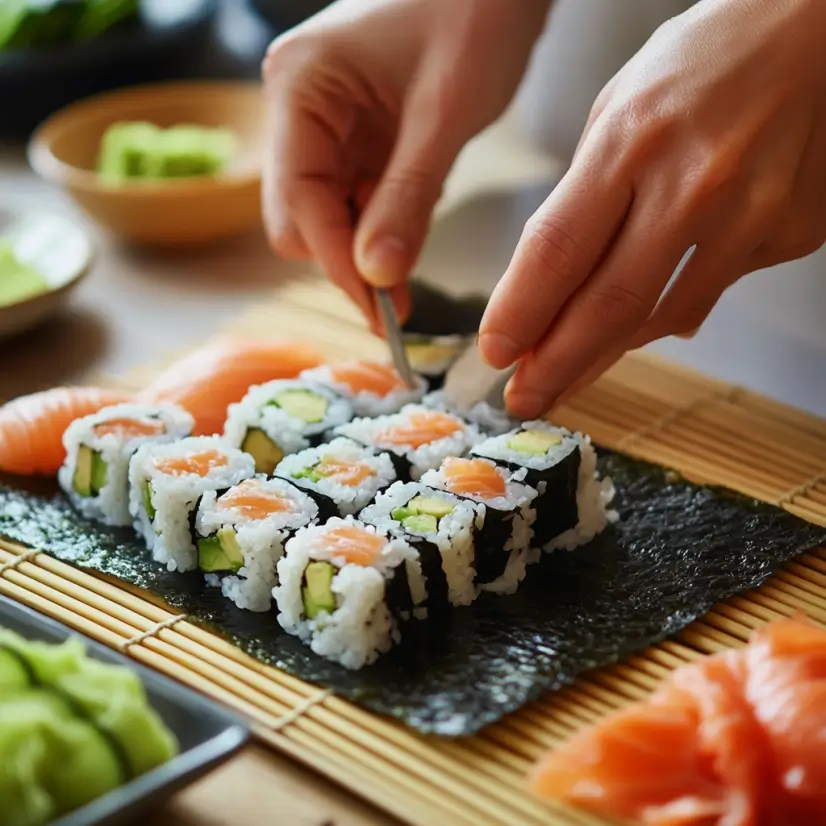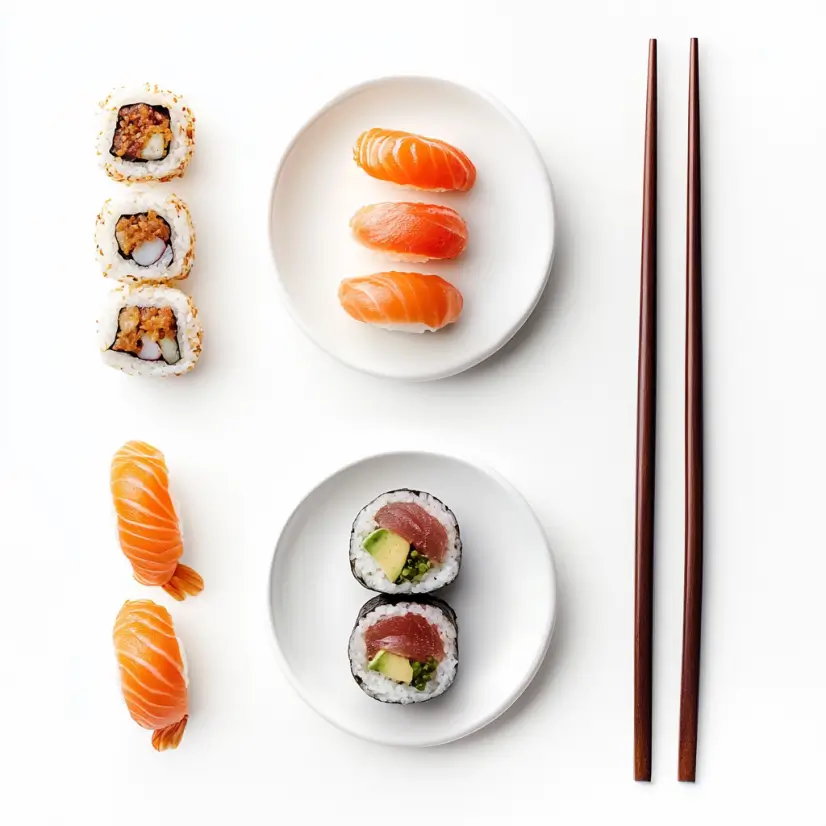Sushi is more than just food; it’s a flavorful expression of culture, history, and artistry. Whether you’re savoring delicate sashimi slices or mastering the art of rolling your own maki, sushi offers something for everyone. This article dives deep into the yummy world of sushi, exploring its rich history, diverse styles, tips for enjoying it like a pro, and even how to craft it at home. Let’s embark on this sushi-filled journey!
Table of Contents
Introduction to Sushi
What is Sushi?
Sushi is a traditional Japanese dish that harmoniously blends cooked rice, seasoned with vinegar, and fresh ingredients like fish, vegetables, or seaweed. It’s not just food; it’s an art form that emphasizes balance, freshness, and presentation. While its origins lie in Japan, sushi has grown into a global phenomenon, loved for its unique flavors and versatility.
Sushi comes in various forms, from simple rolls to intricate creations. The term “sushi” itself refers to the vinegared rice, which serves as the foundation for these creations. What makes sushi stand out is its ability to combine subtle flavors and textures, turning a simple meal into an extraordinary experience.
The Popularity of Sushi Worldwide
Over the years, sushi has transcended cultural boundaries, becoming a global culinary favorite. From high-end restaurants in Tokyo to bustling sushi bars in New York, this yummy delicacy has made its mark everywhere. What fuels this widespread appeal? A mix of its health benefits, visual appeal, and customizable nature.
Moreover, sushi isn’t just a meal; it’s an experience. Watching skilled chefs expertly craft intricate rolls or slice sashimi with precision is nothing short of mesmerizing. Its popularity is further enhanced by its adaptability—whether you prefer raw fish, vegetarian options, or cooked varieties, there’s a sushi style for you.
The Varieties of Sushi
Types of Sushi You Must Try
Sushi offers a delicious variety that caters to all tastes, from the adventurous foodie to the cautious diner. Some popular types include:
- Nigiri: Hand-formed rice topped with fresh slices of fish, like salmon or tuna. It’s simple yet packed with flavor.
- Maki: Sushi rolls wrapped in seaweed, filled with ingredients like avocado, crab, or cucumber. Perfect for beginners!
- Sashimi: Thinly sliced raw fish served without rice, showcasing the pure taste of seafood.
- Uramaki: Inside-out rolls with rice on the outside and fillings like tempura shrimp or spicy tuna inside.
- Temaki: Cone-shaped seaweed wraps filled with rice and ingredients, perfect for a quick, handheld treat.
Special Regional Sushi Styles
Sushi styles can vary by region, adding an exciting twist to this yummy sushi journey. For example, in Osaka, Oshizushi is a pressed sushi style where fish and rice are compacted into a box. Meanwhile, Kyoto offers Saba-zushi, made with cured mackerel, which delivers a unique and tangy taste.
Across the U.S., sushi innovation thrives with creative adaptations like the California Roll and Rainbow Roll. These modern creations blend Japanese tradition with local flavors, ensuring that sushi evolves while staying true to its essence.
How to Enjoy Yummy Sushi
How to Choose Fresh and Quality Sushi
Selecting high-quality sushi starts with identifying fresh ingredients. Look for:
- Bright, translucent fish: Fresh fish has a shiny, moist appearance.
- Firm texture: Fresh sushi should spring back when pressed lightly.
- Fragrant rice: Sushi rice should smell lightly of vinegar, not overly sour or stale.
If dining out, opt for reputable sushi bars where chefs display their craftsmanship. For prepackaged sushi, check for tight rolls and expiration dates.
Mastering the Art of Eating Sushi
Eating sushi isn’t just about taste; it’s an art! Follow these tips to enjoy your sushi like a pro:
- Use chopsticks for rolls and fingers for Nigiri—it’s perfectly acceptable.
- Dip the fish side of the sushi, not the rice, into soy sauce to avoid overpowering the flavors.
- Cleanse your palate with pickled ginger between bites for a refreshed taste.
For a modern twist, pair your sushi with sake or even sparkling water. These little rituals elevate the entire experience, making your yummy sushi adventure unforgettable.
Making Yummy Sushi at Home

Essential Ingredients and Tools
Making yummy sushi at home is easier than you think when you have the right tools and ingredients. Here’s what you’ll need:
- Rice: Use short-grain or medium-grain Japanese rice for the perfect sticky texture.
- Nori: Sheets of dried seaweed are essential for rolling sushi.
- Fresh fish and fillings: Opt for sushi-grade fish, avocado, cucumber, and pickled vegetables.
- Seasonings: Rice vinegar, sugar, and salt are key for properly seasoned rice.
- Tools: A bamboo sushi mat, sharp knife, and small bowl of water for keeping your hands moist.
These essentials lay the groundwork for delicious, homemade sushi.
Step-by-Step Guide to Homemade Sushi
- Prepare the Rice: Rinse the rice until the water runs clear, then cook it. Season the cooked rice with a mix of rice vinegar, sugar, and salt.
- Lay the Foundation: Place a sheet of nori on a bamboo mat, shiny side down. Spread a thin layer of rice evenly over the nori, leaving about an inch at the top.
- Add Fillings: Layer thin slices of fish, avocado, cucumber, or any fillings you love.
- Roll It Up: Using the bamboo mat, roll the sushi tightly, applying gentle pressure to secure the shape.
- Slice and Serve: Use a sharp, wet knife to slice the roll into even pieces.
For a detailed recipe on a different Japanese-inspired dish, visit this Simply Yummy guide. While not sushi-related, it offers another way to enjoy seafood with flair.
The Health Benefits of Sushi
Nutritional Value of Sushi
Sushi is not only yummy but also a nutrient-packed dish. Ingredients like fish, seaweed, and vegetables provide:
- Omega-3 fatty acids: Found in fish like salmon and tuna, they promote heart and brain health.
- Protein: Essential for muscle repair and energy.
- Vitamins and minerals: Nori is rich in iodine and vitamin B12, while vegetables provide fiber and antioxidants.
When paired with brown rice, sushi can be even more nutritious, offering sustained energy.
Is Sushi a Healthy Choice?
Yes, sushi can be a healthy choice—if you select wisely! Avoid options overloaded with mayo or fried tempura. Stick to simple rolls like tuna, salmon, or cucumber maki, which have fewer calories and more wholesome ingredients.
For more tips on eating healthy, explore other recipes at Simply Yummy that emphasize balanced nutrition, such as their light and savory shrimp dishes.
FAQs About Sushi

Common Questions Answered
What is the difference between sushi and sashimi?
Sushi and sashimi often get mixed up, but they’re quite different. Sushi includes vinegared rice as its base, paired with fish, vegetables, or other toppings. On the other hand, sashimi is all about simplicity—it’s thinly sliced raw fish or seafood, served without rice. Therefore, sashimi emphasizes the purity of the seafood itself, while sushi combines multiple elements for a balanced flavor.
Is sushi safe to eat during pregnancy?
This depends on the type of sushi. Pregnant individuals should avoid raw fish due to the risk of foodborne illnesses. However, they can still enjoy cooked or vegetarian options like tempura rolls or avocado maki, which are just as yummy and satisfying. Additionally, it’s always wise to consult a healthcare provider about dietary choices during pregnancy.
Tips for First-Time Sushi Diners
How do I order sushi as a beginner?
Start with mild and familiar options. California rolls, cucumber rolls, or shrimp tempura are great choices for beginners. In addition, these rolls let you experience the yummy sushi experience without diving into raw fish right away.
What are the best starter options for sushi?
If you’re feeling adventurous, try nigiri topped with cooked shrimp or tamago (sweet egg omelet). Consequently, these options offer a balanced taste that’s easy to enjoy while introducing you to traditional sushi flavors.
Final Thoughts and Recommendations
Celebrating the Art of Sushi
Sushi is more than food—it’s a celebration of flavors, textures, and artistry. Therefore, whether you’re enjoying it at a restaurant, experimenting in your kitchen, or exploring its health benefits, yummy sushi connects people to Japanese culture in the most delicious way. In fact, its versatility means there’s always something new to discover.
Explore More Culinary Adventures
If this article has inspired you, why stop at sushi? For instance, you can expand your culinary horizons with other Japanese-inspired dishes. For more ideas, consider seafood dishes like Simply Yummy’s shrimp pasta, which complements the seafood flavors of sushi wonderfully. Additionally, exploring related recipes can help you build confidence in the kitchen and experiment with new flavors.
In conclusion, sushi offers endless opportunities for enjoyment, whether through traditional preparations or modern innovations.mp pasta , which complement the seafood flavors of sushi wonderfully.
How to Pair Yummy Sushi with Drinks
Traditional Pairings
When it comes to enjoying yummy sushi, the right drink can elevate the experience. Traditionally, Japanese beverages are a fantastic starting point:
- Sake: This classic rice wine complements sushi beautifully, especially with fish like tuna and salmon. Additionally, its light sweetness enhances the umami flavors.
- Green tea: A warm cup of green tea cleanses your palate between bites and adds a soothing touch to your meal. Furthermore, it pairs well with almost any type of sushi.
- Japanese beer: Light lagers like Asahi or Sapporo pair well with sushi’s fresh, delicate flavors. In fact, these beers have become popular outside Japan due to their versatility.
Modern Beverage Choices
For a contemporary twist, consider these modern pairings that enhance the yummy flavors of sushi:
- Sparkling water: The effervescence helps cleanse the palate, keeping each bite as fresh as the first. Moreover, it’s a non-alcoholic option that works for any occasion.
- White wine: Crisp, dry white wines like Sauvignon Blanc work wonderfully with sushi, especially lighter rolls. However, avoid sweet wines as they might overpower the flavors.
- Cocktails: Light, citrusy cocktails such as a Yuzu Spritz add a playful, refreshing contrast to sushi’s savory notes. Thus, these drinks bring a creative edge to your meal.
No matter your choice, a thoughtfully paired drink can therefore transform your sushi dining experience.
The Future of Yummy Sushi
Innovative Trends in Sushi
Sushi is constantly evolving, and today’s chefs are pushing the boundaries of tradition. For instance, innovative trends include:
- Plant-based sushi: Made with ingredients like marinated jackfruit or tofu, these options are perfect for vegetarians. In addition, they cater to the growing demand for plant-based cuisine.
- Creative presentation: Modern sushi often incorporates edible flowers, gold flakes, or artistic plating that turns a meal into a visual masterpiece. On the other hand, simpler traditional sushi still holds a special charm.
- Fusion rolls: Chefs worldwide are blending cuisines, creating unique rolls like spicy kimchi maki or avocado tempura rolls. Consequently, sushi becomes a melting pot of global flavors.
These trends keep yummy sushi exciting for both purists and adventurous eaters.
Sustainability in Sushi
The sushi industry is becoming more eco-conscious, focusing on:
- Sustainable seafood: Chefs are choosing fish from sustainable sources to protect marine ecosystems. For example, sourcing tuna responsibly can make a big impact.
- Local ingredients: Sourcing ingredients locally reduces carbon footprints and supports regional farmers. Thus, diners enjoy fresh, seasonal produce.
- Reducing waste: Many sushi restaurants are adopting zero-waste practices, using every part of the fish and recycling food scraps. Therefore, sustainability becomes a key focus of modern sushi.
As sushi evolves, its future looks not only delicious but also environmentally friendly. In conclusion, these efforts ensure that sushi remains a beloved and responsible culinary tradition.

